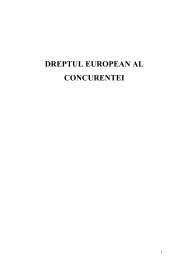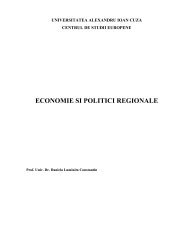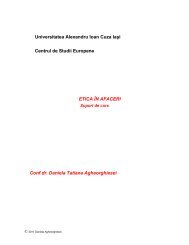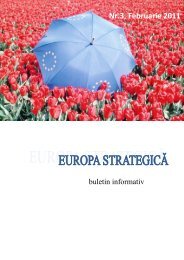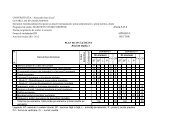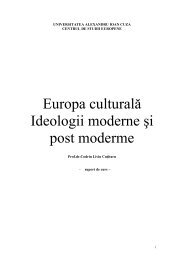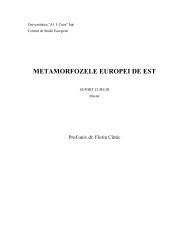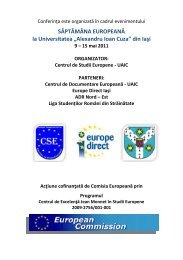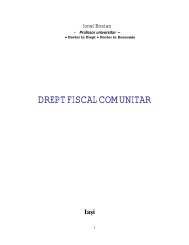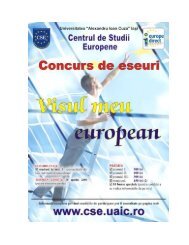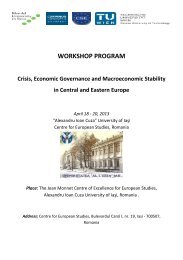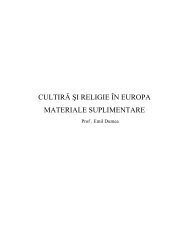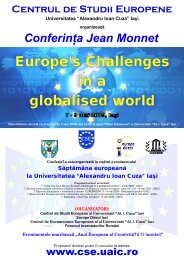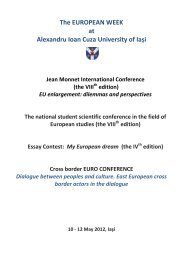EURINT 2013 | May 15 - 17 | IaÈi - Romania | 1
EURINT 2013 | May 15 - 17 | IaÈi - Romania | 1
EURINT 2013 | May 15 - 17 | IaÈi - Romania | 1
You also want an ePaper? Increase the reach of your titles
YUMPU automatically turns print PDFs into web optimized ePapers that Google loves.
4 | CENTRE FOR EUROPEAN STUDIES | WWW.CSE.UAIC.ROWELCOMING REMARKSVASILE IȘANRECTOR OF THE ALEXANDRU IOAN CUZA UNIVERSITYDistinguished guests,It is a great pleasure and honour to welcome you at the Alexandru Ioan CuzaUniversity of Iasi to the <strong>EURINT</strong> International Conference THE EU AS A MODELOF SOFT POWER IN THE EASTERN NEIGHBOURHOOD. The University of Iasi isknown throughout <strong>Romania</strong> and Eastern Europe for its research expertise andoutstanding scientists and its constant interest in dealing with the countriesfrom the Eastern neighbourhood of the European Union. Thanks to generousinternationally-funded projects in European excellence networks we havemanaged since 2000 to create under the umbrella of the Centre for EuropeanStudies a platform which fosters discussions and provides analytical researchon the most up-to-date policy issues relating to the EU.Due to our university unique geographic position, this platform gives us theopportunity to invite renowned international experts for discussing andfinding solutions to some of the most pressing challenges the EU is facing,among others, the future of the countries positioned in the Eastern proximityof the European Union. Furthermore, taking into account <strong>Romania</strong>'sexperience gained in pre-accession period, we consider regional cooperationbetween the specialists from universities and research institutes located in theborder area is one of the key methods of creating interdependencies,promoting connections between public and private environment, institutions,attitudes and behaviours.The <strong>EURINT</strong> conference is not exclusively about discussing what lies ahead inthe cooperation framework between the EU and the Eastern Partnershipcountries, but also about celebrating the values we aspire to achieve:strengthening democracy and stability in the region, free market andindependent justice. We are also glad that we have among us suchdistinguished guests (professors, experts, students, young professionals and
6 | CENTRE FOR EUROPEAN STUDIES | WWW.CSE.UAIC.ROGABRIELA CARMEN PASCARIUDIRECTOR OF THE CENTRE FOR EUROPEAN STUDIES - ALEXANDRU IOAN CUZAUNIVERSITYDear guests, colleagues and students,On behalf of the Organising Committee, I am delighted to welcome you tothe international conference THE EU AS A MODEL OF SOFT POWER IN THEEASTERN NEIGHBOURHOOD hosted and organised by the Centre forEuropean Studies of the University of Iasi. This event is generously supportedby the European Commission through the Jean Monnet Life Long LearningProgramme – Key Activity 1 (Information and Research Activities) and it ispart of the wider research project “The EU as regional player. Cooperationand integration in Eastern neighbourhood (<strong>EURINT</strong>)” the Centre forEuropean Studies has been awarded with.This project has been the result of the intensive research focusing on theneighbourhood issues carried out by a dedicated team of professors,researchers and young professionals from our university. In addition, thisevent is also part of the annual European Week launched by our institution adecade ago, a series of academic initiatives such as conferences, workshopsand debates which already reached the ninth edition.The heart of the <strong>EURINT</strong> <strong>2013</strong> conference consists of both interactive panelsmoderated and attended by our distinguished guests and of presentationsessions dedicated exclusively to our young researchers and professionals.The three-day period of conference aims to transmit knowledge about the EUinternational role, particularly in its Eastern neighbourhood, a region of vitalimportance for all of us and also to draw together scholars, experts, civilsociety activists and encourage an exchange of views.The purpose of this event is to provide a proper context for mutual dialogue,joint knowledge and a better understanding of the challenges the EU faceswhen acting within and outside its boundaries.It is usually in a time of crisis and transitions when emphasis is put on theimportance of leadership of future generations, especially for those who show
<strong>EURINT</strong> <strong>2013</strong> | <strong>May</strong> <strong>15</strong> - <strong>17</strong> | Iași - <strong>Romania</strong> | 7a genuine interest in enhancing their research and practical skills in Europeanstudies and in contributing to developing a transnational network of contactsand cooperation.I believe the place where our conference takes place is significant, taking intoconsideration that Iasi is one of the easternmost cities of the European Union,a very important academic centre for <strong>Romania</strong> and also a cradle of <strong>Romania</strong>nhistory and culture. Our city could not only serve as a bridge between theWest and East, but also as a starting point for developing strongerconnections between our country, the European Union and our EasternEuropean friends.We have done our best to prepare this event and we hope that it will be apleasant and useful experience both for its academic quality and informalsocial networking. Hence, I am delighted to welcome you all to Iasi at theAlexandru Ioan Cuza University and I would use this opportunity to thank bothour distinguished experts and participants for attending our event.I really hope the <strong>EURINT</strong> conference will provide a unique opportunity toestablish a platform of cooperation among those with a genuine interest inthe future of the countries situated in the Eastern neighbourhood of theEuropean Union. I also do hope these days spent in our charming city will giveyou enough inspiration to build momentum for future projects and initiatives.
8 | CENTRE FOR EUROPEAN STUDIES | WWW.CSE.UAIC.ROABOUT THE CONFERENCEThe European Union as a model of soft power has a powerful attraction inthe world and even a much more influential one in its near abroad. The EUhas an interest in promoting its model as a contribution to good governance,democracy, economic prosperity and security, which are essential prerequisitesto an effective regional cooperation framework. It also has a majorinterest in continuing to preach the merits of sharing sovereignty as anecessary condition to tackling many of today's global problems such assustainable development, poverty, the environment, transnational crime, andmore recently, the economic crisis. Since its inception, the EU has alsobecome the largest trading block and aid provider in the world which giveseven more weight to its international role.The international conference The EU as a model of soft power in the Easternneighbourhood, within the project The EU as regional player. Cooperationand integration in Eastern neighbourhood (<strong>EURINT</strong>), is generously supportedby the European Union under the Jean Monnet Life Long LearningProgramme - Key Activity 1. It is an international academic event whichaddresses to you, those who show a genuine interest in enhancing theirresearch skills in European studies and in contributing to developing atransnational network of contacts and cooperation.The three-day period (<strong>May</strong> <strong>15</strong>-<strong>17</strong>, <strong>2013</strong>) aims to transmit knowledge aboutthe EU international role, particularly in its Eastern neighbourhood, to drawtogether scholars, popular experts, civil society activists and encourage anexchange of views.Academic sessionsA. The EU as regional and global player. Cooperation or geopoliticalcompetition?The EU is an important regional actor exercising both structural andnormative power in relation to the outside world. This section focuses onthe challenges to the EU's soft power raised by the other competinggeopolitical actors such as the Russian Federation, USA and, increasingly,China which all exhibit certain degree of influence in the EU'sneighbourhood.
<strong>EURINT</strong> <strong>2013</strong> | <strong>May</strong> <strong>15</strong> - <strong>17</strong> | Iași - <strong>Romania</strong> | 9Issues to be debated:- Political and economic cooperation vs. rivalries between the EU and the socalledBRICS block of states,- Challenges for the neighbourhood states (future of the EuropeanNeighbourhood Policy (ENP),- Arab Spring, frozen conflicts in the EU's Eastern proximity,- Geopolitics, spheres of influence,- The need for a stronger European External Action Service,- Etc.B. The EU "transformative power" in the neighbourhoodRecent contributions to the European integration literature have pointedout that the transfer/absorption of European values, norms andprinciples (i.e. Europeanization process) could be influential even beyondthe EU's geographic boundaries, particularly with regards to candidatecountries and neighbouring states. This section points out that thediffusion of European ideas can be important means of exporting abroadthe EU soft power model.In this context, we can also bring to the fore the social web and mobiletechnologies, which have accelerated the rate at which relationshipsdevelop, information is shared and influence takes hold. People now usesocial technology to help shape the world's events and culture and alsoengage in the political and economic aspects of the community theybelong to.Issues to be debated:- The effectiveness of the Europeanization process outside EU's frontiers,- EU conditionality,- Limits of the Europeanization process,- Modern electronic communication opportunities,- The power of social networks (Arab Spring, Occupy Wall-Street etc.),- Consumer community (Facebook, Twitter, smart phones, social feeds, onlineforums),- Etc.
10 | CENTRE FOR EUROPEAN STUDIES | WWW.CSE.UAIC.ROC. The Eastern Partnership (EaP) looking forward: achievements and futureSecurity and integration have constituted two paramount and deeplyintertwined priorities in the EU neighbourhood. In terms of foreignpolicy, the ENP and the EaP are both security oriented aiming also atenhancing the political association and fostering democratic principlesand the creation of a free trade area and economic integration with theEU.Issues to be debated:- The EU-EaP states relationship,- Implications for the economic and political future of the Easternneighbourhood countries,- EU's contribution to good governance, democracy, economic prosperity andsecurity etc.D. The consequences of the economic crisis on EU's competitivenessEurope has a major role in the world economy and its economicincentives have been the most effective instruments for generatingstructural change even in the neighbourhood.Issues to be debated:- EU internal market,- European Monetary Union,- The negative consequences of the economic crisis on EU's economic strength,- Etc.E. Regional development and European governance: achievements,obstacles and incentivesDeep economic engagement, multilateral frameworks of trade relations,foreign direct investments have been EU's main tools when actinginternationally. However, the current economic downturn has many timeshindered or postponed EU's economic profile on the global scene.Issues to be debated:- Regional development (including the neighbouring states area),- Cross-border cooperation etc.
<strong>EURINT</strong> <strong>2013</strong> | <strong>May</strong> <strong>15</strong> - <strong>17</strong> | Iași - <strong>Romania</strong> | 11INVITED EXPERTSWe would like to express our gratitude to our invited lecturers:o Mitchell BELFER, Head of Department International Relations &European Studies Metropolitan University Prague, Czech Republic;o Erhard BUSEK, Professor, University of Vienna, Coordinator of the South-Eastern Cooperative Initiative (SECI) and Chairman of the Institute for theDanube Region and Central Europe;o Laure DELCOUR, Senior Research Fellow (Research Director), Institute ofInternational and Strategic Relations, Paris; Directorate of EuropeanAffairs, French National School of Administration;o Adelaide DUARTE, Professor, University of Coimbra, Portugal;o Adam EBERHARDT, Deputy Director of the Centre for Eastern Studies,Warsaw, Poland;o Gabor HUNYA, Senior Economist, Vienna Institute for InternationalEconomic Studies, Austria;o Masoud IMANI KALESAR, PhD, Visiting Fellow at the European UnionInstitute for Security Studies, Paris, France and journalist at Euronews;o Kaloyan KOLEV, Assistant Professor, Department of Economics,University of Economics, Varna, Bulgaria;o Elena KOROSTELEVA, Professor of International Politics, Director ofGraduate Studies, School of Politics and IR, Rutherford College, Universityof Kent, United Kingdom;o Hrant KOSTANYAN, Associate research fellow atEuropean Policy Studies (CEPS), Brussels, Belgium;the Centre foro Inna MELNYKOVSKA, Research Fellow at the Institute of Political Science(International Integration), Justus Liebig University Giessen, Germany;o Tiiu PAAS, Professor, University of Tartu, Estonia;o Giles POLGLASE, Professor, University of Kent, United Kingdom.
12 | CENTRE FOR EUROPEAN STUDIES | WWW.CSE.UAIC.ROPRACTICAL INFORMATIONVENUEThe registration, the opening ceremony, panels and parallel sessions willbe held in buildings „A” and „I” of Alexandru Ioan Cuza University (11,Carol I Bd.) - see the map on the back cover of the brochure. A Building (11, Carol I Bd.):o Hall of the lost steps / Sala pașilor pierduți (1 st floor):Registration, Lunch, Coffee breako Senate Hall / Sala Senatului (2 nd floor): opening, sessions,panelso Ferdinand Room / Sala Ferdinand (2 nd floor): panels,sessions I Building (19, Carol I Bd.):o I.1, I.2, I.3 (1 st floor): sessionso I.4 (1 st floor): internet room and printingREGISTRATION DESKOur colleagues will be happy to register you on Thursday, <strong>May</strong> 16 th ,between 8:30 and 9:30 am at the <strong>EURINT</strong> Registration Desk situated inthe Hall of the lost steps of the Alexandru Ioan Cuza University. You will beprovided with a conference package, which will include the finalprogramme, list of speakers and participants and other related materials.We kindly ask you to wear your badge at all times. Access to theconference floor will only be permitted to those wearing their badgeprovided by the Centre for European Studies.PRESENTATIONThe panels will be chaired by external scholars. Each participant will have<strong>15</strong> minutes for an oral presentation. Chairpersons will be strict on time.Paper discussions will take place after each presentation. We stronglyencourage you to prepare a PowerPoint for your presentation (werecommend to have a .pdf version of your presentation). Computers willbe available in each panel room. Presentations will be uploaded oncomputers before the start of the session. Our staff will provide you withtechnical support.
<strong>EURINT</strong> <strong>2013</strong> | <strong>May</strong> <strong>15</strong> - <strong>17</strong> | Iași - <strong>Romania</strong> | 13INTERNETComputers with internet connection will be available in room I.4. In thesame location you have the possibility to print and copy documents.Alternatively, you can have a wireless connection through followingsconnections.o Uaic<strong>15</strong>0 password: uaic@<strong>15</strong>0 (A Building)o <strong>EURINT</strong>1 password: eurint<strong>2013</strong> (I Building)o <strong>EURINT</strong>2 password: eurint<strong>2013</strong> (I Building)LOGISTICIf you have any queries about the conference or you need other practicalinformation (taxis, restaurants, tourist information), the team is there toassist you. Volunteers will be wearing white t-shirts with <strong>EURINT</strong><strong>2013</strong>logo.LOCAL TRANSPORT- Buses to the University: 1, 13, 8, 28, 41. Tickets are available only instations (2 lei per trip).- From Central Station and Airport we recommend to take the taxi (nodirect connection to University).o All taxi are yellowooPrice: ~ 2 Lei / KmCompanies: For You Taxi: 0040.232.222444; Euro Taxi:0040.232.2<strong>17</strong>2<strong>17</strong>; Delta Taxi: 0040.232.222222ACCOMMODATION- University Hotel GAUDEAMUS (Str. Codrescu Nr.1, Phone: 0040.232-20<strong>17</strong>00)- for other hotels, please visit the conference websiteCURENCY EXCHANGE RATES1EUR: 4,3 Lei1USD: 3,4 Lei1GBP: 5,1 Lei
14 | CENTRE FOR EUROPEAN STUDIES | WWW.CSE.UAIC.ROUSEFUL PHONE NUMBRES- Police / Ambulance / Firefighters: 112- Train Timetable: 0232/410636- Iasi International Airport: 0232/278510- Consumer Protection Office: 0232/278233- Centre for European Studies - Alexandru Ioan Cuza University of Iasi:0232/<strong>2013</strong>18CONTACT PERSONS:Foreign participantso Teodor MOGA 0040.742 020 011<strong>Romania</strong>n participantso Alex FOTEA 0040. 740 345 955e-mail: eurint<strong>2013</strong>@gmail.com
<strong>EURINT</strong> <strong>2013</strong> | <strong>May</strong> <strong>15</strong> - <strong>17</strong> | Iași - <strong>Romania</strong> | <strong>15</strong>SOCIAL PROGRAMME OVERVIEWSIGHTSEEINGYou are warmly welcome to explore the historical centre of Iasi on aguided sightseeing tour in the afternoon of <strong>May</strong>, <strong>17</strong> th . A coach bus will beavailable for transportation in front of Gaudeamus Hotel at <strong>15</strong>:30.LunchLunches on Thursday (<strong>May</strong>, 16 th ) and Friday (<strong>May</strong>, <strong>17</strong> th ) will take place inthe Hall of the lost steps (A Building).Conference dinnerDinner on Thursday - <strong>May</strong>, 16 th willtake place at Golden Stone CiricRestaurant(phone:0040.232.244.120).Transportation will be available forparticipants.Departure:- in front of Gaudeamus Hotel- hour: 19.30.Dinner on Friday - <strong>May</strong>, <strong>17</strong> th , will takeplace at Traian Restaurant(1 Unirii Square, Iasi, phone: 0040.232266.666) after the sightseeing tour.
16 | CENTRE FOR EUROPEAN STUDIES | WWW.CSE.UAIC.ROCONFERENCE PROGRAMME<strong>15</strong> <strong>May</strong> <strong>2013</strong>Arrival of participants to IasiInformal meeting: the invited lecturers and the scientific committee of theconference16 <strong>May</strong> <strong>2013</strong>08:30-09:30 Registration of participantsHall of the lost steps - A Building09:30-10:00 Opening CeremonySenate Hall - A BuildingWelcoming remarkso Gabriela Carmen PASCARIU, Head of the Centre for EuropeanStudies - Alexandru Ioan Cuza University of Iasio Vasile IŞAN, Rector - Alexandru Ioan Cuza University of Iasi10:00-11:00 Keynote lectureErhard BUSEK (Professor, University of Vienna, Coordinator ofthe South-Eastern Cooperative Initiative (SECI) and Chairman ofthe Institute for the Danube Region and Central Europe)What is the role of Europe in the 21st Century?11:00-11:<strong>15</strong> Coffee breakHall of the lost steps - A Building
<strong>EURINT</strong> <strong>2013</strong> | <strong>May</strong> <strong>15</strong> - <strong>17</strong> | Iași - <strong>Romania</strong> | <strong>17</strong>11:<strong>15</strong>-13:30 Panel I: The EU policies towards the neighbourhood. WitherEastern Partnership?Ferdinand Room- A BuildingoooLaure DELCOUR * (French National School of Administration)- The EU as a driving force for modernisation in the Easternneighbourhood? Perceptions and expectations from partnercountriesAdam EBERHARDT (Centre for Eastern Studies, Warsaw,Poland)- The Eastern Partnership on the eve of the Vilnius summit:main challengesHrant KOSTANYAN (Centre for European Policy Studies,Brussels, Belgium)- Examining the discretion of the EEAS: what power to act inEU-Moldova relations?Inna MELNYKOVSKA (Justus Liebig University Giessen,Germany)- The EU’s transformative power in the Eastern Partnership.Challenged by Russia’s smart power?13:30-14:30 LunchHall of the lost steps - A Building14:30-18:00 Parallel sessionsA & I Buildings16:00-16:<strong>15</strong> Coffee breakA & I Buildings20:00 Dinner - Golden Stone Restaurant - CiricDeparture from Gaudeamus Hotel at 19.30* Professor Delcour is chairing the panel.
18 | CENTRE FOR EUROPEAN STUDIES | WWW.CSE.UAIC.RO<strong>17</strong> <strong>May</strong> <strong>2013</strong>09:00-11:00 Panel II: Challenging the EU's competitivenessFerdinand Room- A BuildingooooGabor HUNYA * (Vienna Institute for International EconomicStudies, Austria)- EU Crisis and Neighbourhood ResponseLucian DÎRDALĂ (Alexandru Ioan Cuza University of Iasi,<strong>Romania</strong>)- EU soft power in hard times: the political effects of thefinancial crisisKaloyan KOLEV (University of Economics, Varna, Bulgaria)- FDI and regional disparities: convergence or divergence?Tiiu PAAS (University of Tartu, Estonia)- Integration of ethnically diverse societies as a source forfuture economic growth11:00-11:<strong>15</strong> Coffee breakHall of the lost steps - A Building11:<strong>15</strong>-12:30 Parallel sessions (The same chairs as in the first day)A & I Buildings12:45-13:30 Closing SessionSenate Hall - A Building13:30-14:30 LunchHall of the lost steps - A Building<strong>15</strong>:30-19:30 Sightseeing tour of IasiDeparture from Gaudeamus Hotel at <strong>15</strong>:3020:30 Dinner - Traian RestaurantParticipants who will not attend the Sightseeing tour areexpected at Traian Restaurant (see map)* Professor Hunya is chairing the panel.
<strong>EURINT</strong> <strong>2013</strong> | <strong>May</strong> <strong>15</strong> - <strong>17</strong> | Iași - <strong>Romania</strong> | 19PARALLEL SESSIONSSESSION 1:The EU as regional and global player. Impact on the neighbourhoodI Building, Room I.1SESSION 2:The EU "transformative power" in the neighbourhoodI Building, Room I.2SESSION 3:The Eastern Partnership (EaP) looking forward: achievements andfutureI Building, Room I.3SESSION 4:The consequences of the economic crisis on EU's competitivenessA Building, Senate HallSESSION 5:Regional development and European economic governance:achievements, obstacles and incentivesA Building, Room Ferdinand
20 | CENTRE FOR EUROPEAN STUDIES | WWW.CSE.UAIC.ROSESSION 1:The EU as regional and global player. Impact on the neighbourhoodI Building, Room I.1Chair:Masoud IMANI KALESAR,Visiting Fellow at the European Union Institute for Security Studies, Paris,France and journalist at EuronewsChair Assistant:Teodor MOGALecturer, Centre for European Studies,Alexandru Ioan Cuza University of Iasi, <strong>Romania</strong>Thursday, <strong>May</strong>, 16 th , 14:30-18:00 Masoud IMANI KALESAR (Euronews, France) - EU’S challenges in MENA: Arabspring as a case Elena CHERNEGA (Odessa National Economic University, Ukraine) - TheEuropean Union’s leadership potential Mihaela CIUCHINA (Alexandru Ioan Cuza University of Iasi, <strong>Romania</strong>) - Politicalimpact of Chinese foreign direct investments in the European Union Ekaterina ENTINA (National Research University - Higher School of Economics,Moscow, Russia) - The European Union vs. BRICS or working together? Achallenge for Russia Mircea-Cristian GHENGHEA (Alexandru Ioan Cuza University of Iasi, <strong>Romania</strong>) -Challenges of the future - the European Union vs. the Eurasian Union? Ana - Maria GHIMIŞ (National School of Political and Administrative Studies,<strong>Romania</strong>) - The Eastern frontier security case study: <strong>Romania</strong> – Russia Roxana HÎNCU (Alexandru Ioan Cuza University of Iasi, <strong>Romania</strong>) - Euronews - apromoter of the European Union “quiet diplomacy” Fabio INDEO (University of Camerino, Italy) - EU neighbourhood and its"neighbours": EU geopolitical role and strategic ambitions in Caucasus andCentral Asia Adrian Liviu IVAN, Ruxandra NUȚ , Claudia MERA (Babeș-Bolyai University, Cluj-Napoca, <strong>Romania</strong>) - The EU-Morocco relations in the framework of the Europeanneighbourhood policy
<strong>EURINT</strong> <strong>2013</strong> | <strong>May</strong> <strong>15</strong> - <strong>17</strong> | Iași - <strong>Romania</strong> | 21Sebastian-Andrei LABEȘ (Alexandru Ioan Cuza University of Iasi, <strong>Romania</strong>) - Riseof BRICS: opportunity or threat for the European Union?Elena KOROSTELEVA (University of Kent, United Kingdom) - Rethinking EUgovernance in the Eastern region: old challenges and new opportunitiesVladlen МAKOUKH (Regional Branch of National Institute for Strategic Studies inOdessa, Ukraine) - East and South dimensions of the European neighbourhoodpolicy: achievements, current issues and prospectsFriday, <strong>May</strong>, <strong>17</strong> th , 11:<strong>15</strong>-12:30 Gabriela BODEA (Babeș-Bolyai University, Cluj-Napoca, <strong>Romania</strong>), Aurelian-Petruș PLOPEANU (Alexandru Ioan Cuza University of Iasi, <strong>Romania</strong>) - China andIndia, a case study about the mentality highlights in the global equation ofchange Aurelian-Petruș PLOPEANU (Alexandru Ioan Cuza University of Iasi, <strong>Romania</strong>),Gabriela BODEA (Babeș-Bolyai University, Cluj-Napoca, <strong>Romania</strong>) - The changeof mentality, a form of externality. The paradigm of Islamic sustainabledevelopment Valeriu MIJA, Valentina TEOSA (Moldova State University, Republic of Moldova)- European cooperative security system and complex interdependence Teodor Lucian MOGA, Gabriela Carmen PASCARIU (Centre for EuropeanStudies, Alexandru Ioan Cuza University of Iasi, <strong>Romania</strong>) - The EasternPartnership - a strong incentive for reform? Ciprian ALUPULUI (Centre for European Studies, Alexandru Ioan Cuza Universityof Iasi, <strong>Romania</strong>) - EU Governance in Eastern Europe: between strategies andspatial contingencies Sabina ŢUCA, Zîna MARCU (Alexandru Ioan Cuza University of Iasi, <strong>Romania</strong>) -The European Union and the Middle East: an unusual partnership
22 | CENTRE FOR EUROPEAN STUDIES | WWW.CSE.UAIC.ROSESSION 2The EU "transformative power" in the neighbourhoodI Building, Room I.2Chair:Mitchell BELFER,Head of Department “International Relations & European Studies”,Metropolitan University Prague, Czech RepublicChair Assistant:Lucian DÎRDALĂLecturer, Centre for European Studies,Alexandru Ioan Cuza University of Iasi, <strong>Romania</strong>Thursday, <strong>May</strong>, 16 th , 14:30-18:00 Mitchell BELFER (Metropolitan University Prague, Czech Republic) - The rise andfall of soft power Europe: What comes next? Natalia COLESNIC (Moldovan State University, Faculty of International Relations,Political and Administrative Sciences, Republic of Moldova) - The role of nationalparliament in Moldova’s European integration: towards greater democratization Adrian-Gabriel CORPĂDEAN (Babeș-Bolyai University, Cluj-Napoca, <strong>Romania</strong>) -EUROPE 2020 - A “soft” agenda for Central and Eastern Europe? Ina CROITORU (Gh. Zane University of Iasi, <strong>Romania</strong>), Alina TROCIN (AlexandruIoan Cuza University of Iasi, <strong>Romania</strong>) - Modalities of influencing the behaviourand formation of Moldavian students by the front office personnel of Iasiuniversities Lucian-Dumitru DÎRDALĂ (Alexandru Ioan Cuza University of Iasi, <strong>Romania</strong>) -Beyond Soft Power: the issue of payments and the limits of soft-power accountsof the Eastern Partnership Halil ERDEMİR (Celal Bayar University, Manisa, Turkey), Buğrahan Nuri ERDEMİR(Anadolu Turizm ve Otelcilik Meslek Lisesi, Manisa, Turkey) - The EU’S softattraction of Eastern neighbours and its international consequences as in theexample of Ukraine Roxana HÎNCU (Alexandru Ioan Cuza University of Iasi, <strong>Romania</strong>) - The softpower sources of the European Union: challenges and opportunities Martin MENDELSKI (University of Luxembourg) - Limits of the EU’stransformative power: evidence from rule of law promotion in Moldova
<strong>EURINT</strong> <strong>2013</strong> | <strong>May</strong> <strong>15</strong> - <strong>17</strong> | Iași - <strong>Romania</strong> | 23Maxim MIROSHNIKOV (Tomsk State University, Russia) - Soft power: case of theEuropean UnionKristian NIELSEN (Copenhagen Business School, Denmark) - The importance ofbeing earnest: Ukraine and EU soft powerAgnes NICOLESCU (European Institute of <strong>Romania</strong>) - Eastern Partnershiproadmap 2012 - <strong>2013</strong> and the European enlargement strategy: main challengesto the conditionality and differentiated integrationGiles POLGLASE (University of Kent, UK) - The failure of higher education as atransformative power: the case of BelarusFriday, <strong>May</strong>, <strong>17</strong> th , 11:<strong>15</strong>-12:30 Gimia-Virginia BUJANCĂ (Alexandru Ioan Cuza University of Iasi, <strong>Romania</strong>) - TheEuropean soft-power dimension in the Eastern neighbourhood Sabina STRIMBOVSCHI (National School of Political and Administrative Studies,<strong>Romania</strong>) - The impact of the EU’s public diplomacy, as an instrument of softpower, in the context of the Eastern Partnership Nicoleta VASILCOVSCHI (Cygnus Scientific Society, Suceava, <strong>Romania</strong>) - A neweconomic diplomacy towards the Eastern Partnership states Victor NEGRESCU (Dimitrie Cantemir Christian University, <strong>Romania</strong>) - EUdevelopment cooperation policies towards neighbouring countries Sabina ȚUCA, Zîna MARCU (Alexandru Ioan Cuza University of Iasi, <strong>Romania</strong>) -The European Union and Russia - providers and recipients of stability and securityin the European area Cristina ZEȚU (Alexandru Ioan Cuza University of Iasi, <strong>Romania</strong>) - Europeanidentity beyond EU borders: the case of Turkey`s membership
24 | CENTRE FOR EUROPEAN STUDIES | WWW.CSE.UAIC.ROSESSION 3:The Eastern Partnership (EaP) looking forward: achievements and futureI Building, Room I.3Thursday, <strong>May</strong>,16 th , 14:30-18:00 & Friday, <strong>May</strong>, <strong>17</strong> th , 11:<strong>15</strong>-12:30Chair:Inna MELNYKOVSKA,Research Fellow at the Institute of Political Science (International Integration),Justus Liebig University Giessen, GermanyChair Assistant:Virgil STOICAProfessor, Centre for European Studies,Alexandru Ioan Cuza University of Iasi, <strong>Romania</strong>Thursday, <strong>May</strong>, 16 th , 14:30-18:00 Grażyna WOJTKOWSKA-ŁODEJ, Ewelina SZCZECH-PIETKIEWICZ (Institute ofForeign Trade and European Studies, Warsaw School of Economics, Warsaw,Poland) - Consequences of the economic crisis for the European Union andEastern Partnership development. Chosen aspects Boris CHISTRUGA, Dorina HARCENCO (Academy of Economic Studies ofMoldova, Republic of Moldova) - Peculiarities of the Republic of Moldova tradepolicy within the negotiations of the association agreement with the EU Boris CHISTRUGA, Rodica CRUDU (Academy of Economic Studies of Moldova,Republic of Moldova) - Enhancing ICT and innovation in EU and Moldova:achievements and impact Nadiia BUREIKO (Yurii Fedkovych Chernivtsi National University, Ukraine) - Thecooperation between the EU and Ukraine in the period of intensifying integrationprocesses in the post-soviet area Oksana DOBRZHANSKA (Yurii Fedkovych Chernivtsi National University, Ukraine)- Guaranty providing by the European Union in the economy integration in thecontext of the Eastern Partnership implementation Lavinia DOVLEAC, Ileana TACHE (Transilvania University of Brasov, <strong>Romania</strong>) -Impact of Eastern Partnership on the economic development of Georgia andUkraine
<strong>EURINT</strong> <strong>2013</strong> | <strong>May</strong> <strong>15</strong> - <strong>17</strong> | Iași - <strong>Romania</strong> | 25 Kristian NIELSEN (Copenhagen Business School, Denmark), Maili VILSON(University of Tartu, Estonia) - The Eastern Partnership - soft power strategy orpolicy failure? Marcela SLUSARCIUC (Ștefan cel Mare University, Suceava, <strong>Romania</strong>) -Challenges of the cross-border cooperation programmes at the Eastern border ofthe European Union Nicolae TODERAŞ, Ana-Maria STĂVARU (National School of Political Studies andPublic Administration, <strong>Romania</strong>) - An evaluation-based approach for optimisingthe policy transfer from the EU towards the members of the Eastern Partnership:case study on the Republic of Moldova Virgil STOICA (Alexandru Ioan Cuza University of Iasi, <strong>Romania</strong>) - EuropeanUnion's digital divideFriday, <strong>May</strong>, <strong>17</strong> th , 11:<strong>15</strong>-12:30 Cristina-Maria DOGOT (University of Oradea, <strong>Romania</strong>) - European Union, Russiaand ENP/EaP Countries Brîndușa-Nicoleta PINCU (Babeș-Bolyai University, Cluj-Napoca, <strong>Romania</strong>) - TheEU-Ukraine relation dynamics Loredana SIMIONOV (Centre for European Studies, Alexandru Ioan CuzaUniversity of Iasi, <strong>Romania</strong>) - The Eastern European neighbourhood - a “bridge”between Russia and the European Union Ştefana VARVARI, Marius CRISTEA (Babeș-Bolyai University, Cluj-Napoca,<strong>Romania</strong>) - The analysis of the convergence process of the Eastern partnershipcountries Dana BAKO, Ştefana VARVARI (Babeș-Bolyai University, Cluj-Napoca, <strong>Romania</strong>)- Foreign direct investments in the countries from the Eastern Partnership in thelast decade
26 | CENTRE FOR EUROPEAN STUDIES | WWW.CSE.UAIC.ROSESSION 4:The consequences of the economic crisis on EU's competitivenessA Building, Senate HallThursday, <strong>May</strong>, 16 th , 14:30-18:00 & Friday, <strong>May</strong>, <strong>17</strong> th , 11:<strong>15</strong>-12:30Chair:Adelaide DUARTEProfessor, University of Coimbra, PortugalChair Assistant:Doru BOTEZATResearcher, Centre for European Studies,Alexandru Ioan Cuza University of Iasi, <strong>Romania</strong>Thursday, <strong>May</strong>, 16 th , 14:30-18:00Roxana-Maria IACOB (GRECU) (Alexandru Ioan Cuza University of Iasi, <strong>Romania</strong>)- Economic crisis in EU countries. a quantitative approachAna-Maria AMARIEI (Alexandru Ioan Cuza University of Iasi, <strong>Romania</strong>) - Fertilityand demographic policies in EuropeLivia BACIU (Alexandru Ioan Cuza University of Iasi, <strong>Romania</strong>), Alina BOTEZAT(<strong>Romania</strong>n Academy, <strong>Romania</strong>) - Entrepreneurship, innovation and public sectorperformance in the 27 EU countriesLudmila BORTĂ (Alexandru Ioan Cuza University of Iasi, <strong>Romania</strong>) - The currentEU`s preferences on trade agreementsDoru BOTEZAT (Centre for European Studies, Alexandru Ioan Cuza University ofIasi, <strong>Romania</strong>) - Opportunities and barriers to cross border cooperation between<strong>Romania</strong>, Moldova and UkraineSebastian-Florian ENEA, Silvia PALAȘCĂ (Alexandru Ioan Cuza University of Iasi,<strong>Romania</strong>) - Business cycle synchronization channels in the European UnionAndreea GRĂDINARU, Mihaela IAVORSCHI (Alexandru Ioan Cuza University ofIasi, <strong>Romania</strong>) - The economic crisis: incentive of the European integration ordesintegration?Mihaela IFRIM (Alexandru Ioan Cuza University of Iasi, <strong>Romania</strong>) - Capital goodsand consumer goods industries during the business cycleOlga KEREKESHA, Y. BARABASH (Odessa National Economic University, Ukraine)- Usage of interactive author’s technology "destination" to improve theprofessional competence of future economists
<strong>EURINT</strong> <strong>2013</strong> | <strong>May</strong> <strong>15</strong> - <strong>17</strong> | Iași - <strong>Romania</strong> | 27Mikhael ZVERYAKOV (Odessa National Economic University, Ukraine) - Thedevelopment of neoliberal theory in the Ukrainian economyAndreea IACOBUȚĂ (Alexandru Ioan Cuza University of Iasi, <strong>Romania</strong>), VictorPLOAE (Ovidius University, Constanța, <strong>Romania</strong>), Mircea ASANDULUI (AlexandruIoan Cuza University of Iasi, <strong>Romania</strong>) - Comparative analysis of the performanceof European healthcare systemsFriday, <strong>May</strong>, <strong>17</strong> th , 11:<strong>15</strong>-12:30 Mihaela AMARANDEI (Alexandru Ioan Cuza University of Iasi, <strong>Romania</strong>) - Thedynamics of foreign direct investments and country risk in ENP - East countries Sînziana BĂLȚĂTESCU, Liviu-George MAHA (Alexandru Ioan Cuza University ofIasi, <strong>Romania</strong>) - The nexus between state and market in Central Eastern Europe Nicoleta MIHĂILĂ, Silvia Elena ISACHI (Financial and Monetary Research Centre„Victor Slăvescu”, Bucharest, <strong>Romania</strong>) - Dimension of firm performance on thesingle European market Oana-Ramona SOCOLIUC (Alexandru Ioan Cuza University of Iasi, <strong>Romania</strong>) -<strong>Romania</strong> in the EU: an institutionalist approach to poor economic dynamics Clara VOLINTIRU (Bucharest Academy of Economic Studies (ASE), <strong>Romania</strong>) -Institutions and the labour dynamics: <strong>Romania</strong> in the European context Andreea GRĂDINARU, Mihaela IAVORSCHI (Alexandru Ioan Cuza University ofIasi, <strong>Romania</strong>) - Euro - the main pillar of the European Economic and MonetaryUnion
28 | CENTRE FOR EUROPEAN STUDIES | WWW.CSE.UAIC.ROSESSION 5:Regional development and European economic governance: achievements,obstacles and incentivesA Building, Room FerdinandThursday, <strong>May</strong>,16 th , 14:30-18:00 & Friday, <strong>May</strong>,<strong>17</strong> th , 11:<strong>15</strong>-12:30Chair:Gabor HUNYASenior Economist, Vienna Institute for International Economic Studies, AustriaChair Assistant:Ramona FRUNZĂ (ȚIGĂNAȘU)Researcher, Centre for European Studies,Alexandru Ioan Cuza University of Iasi, <strong>Romania</strong>Thursday, <strong>May</strong>, 16 th , 14:30-18:00 Adelaide DUARTE (University of Coimbra, Portugal) - Tertiarization and humancapital, does it matter for growth? - The case of Portugal Ana-Maria BERCU (Alexandru Ioan Cuza University of Iasi, <strong>Romania</strong>) - Socialresponsibility as a strategic tool for the European administrative space Oana Ancuţa STÂNGACIU (Vasile Alecsandri University of Bacău, <strong>Romania</strong>) - Thestructural changes of the regional export specialization processes in <strong>Romania</strong> Lenuţa CARP (Alexandru Ioan Cuza University of Iasi, <strong>Romania</strong>) - Challenges inthe Central and Eastern European countries during the globalization andeconomic crisis Mădălina Ștefania DÎRZU (Alexandru Ioan Cuza University of Iasi, <strong>Romania</strong>) -Regional convergence and agglomeration in the European Union: a spatialapproach Petronela Daniela FERARU (Alexandru Ioan Cuza University of Iasi, <strong>Romania</strong>) -Affective migration versus economic migration in <strong>Romania</strong> Ciprian IFTIMOAEI (Government of <strong>Romania</strong>, <strong>Romania</strong>) - Controversies regardingthe security of <strong>Romania</strong>’s Eastern border in view of joining the Schengen area Claudia Anamaria IOV, Adrian Daniel STAN, Maria Mihaela NISTOR (Babeș-Bolyai University, Cluj-Napoca, <strong>Romania</strong>) - <strong>Romania</strong> and the Schengen file:between immigration and human rights
<strong>EURINT</strong> <strong>2013</strong> | <strong>May</strong> <strong>15</strong> - <strong>17</strong> | Iași - <strong>Romania</strong> | 29 Daniel JURAVLE, Claudiu ȚIGĂNAȘ (Alexandru Ioan Cuza University of Iasi,<strong>Romania</strong>) - Liberalisation of the workforce in the EU and the impact ofremittances on the <strong>Romania</strong>n labour market Andrei MAXIM (Alexandru Ioan Cuza University of Iasi, <strong>Romania</strong>) - The impact oftransactional and relational marketing on customer retention in the <strong>Romania</strong>neconomic environment Alexandru MAXIM (Alexandru Ioan Cuza University of Iasi, <strong>Romania</strong>) - Assessing<strong>Romania</strong>’s energy policy in the context of a green Europe Mihaela TOFAN (Alexandru Ioan Cuza University of Iasi, <strong>Romania</strong>) -Particularities of the legal framework for the European civil serviceFriday, <strong>May</strong>, <strong>17</strong> th , 11:<strong>15</strong>-12:30 Laura DIACONU (MAXIM) (Alexandru Ioan Cuza University of Iasi, <strong>Romania</strong>) -The impact of the demographic aspects on the <strong>Romania</strong>n social-economicenvironment Ada-Iuliana POPESCU (Alexandru Ioan Cuza University of Iasi, <strong>Romania</strong>),Christopher KELLEY (University of Arkansas, USA) - Fighting business corruptionbeyond borders: the European perspective Cătălin ŢACU (Alexandru Ioan Cuza University of Iasi, <strong>Romania</strong>) - Eastern „lowexpats”: mixing „roaming” of human resource management with host countrylabour standards within European Union Mara URSACHE (Centre for European Studies, Alexandru Ioan Cuza University ofIasi, <strong>Romania</strong>) - Sustainable development - a challenge for the Easternneighbourhood states Petronela Daniela FERARU (Alexandru Ioan Cuza University of Iasi, <strong>Romania</strong>) -The need and efficiency of migration policies in <strong>Romania</strong> Ramona FRUNZĂ (ŢIGĂNAŞU), Gabriela Carmen PASCARIU (Centre forEuropean Studies, Alexandru Ioan Cuza University of Iasi, <strong>Romania</strong>) - The pathtowards cohesion: reflections on research and development sector in theEuropean Union Sorin MAZILU (Centre for European Studies, Alexandru Ioan Cuza University ofIasi, <strong>Romania</strong>) - A model for analyzing creativity as an enhancing factor overregional development
SessionRoom30 | CENTRE FOR EUROPEAN STUDIES | WWW.CSE.UAIC.ROLIST OF PARTICIPANTS*LEGENDI1, I2, I3 – rooms in I BuildingSH – Senate Hall – A BuildingFR – Ferdinand Room – A BuildingP1, P2 - panelsCiprian ALUPULUI - Alexandru Ioan Cuza University of Iași, RO ciprian.alupului@uaic.roMihaela AMARANDEI - Alexandru Ioan Cuza University of Iași, RO mihaela.amarandei@gmail.comAna-Maria AMARIEI - Alexandru Ioan Cuza University of Iași, RO marina.amariei@gmail.comMircea ASANDULUI - Alexandru Ioan Cuza University of Iași, RO asmircea@yahoo.comLivia BACIU - Alexandru Ioan Cuza University of Iași, RO baciu_livia@yahoo.comDana E. BAKO - Babeș-Bolyai University, Cluj-Napoca, RO dana.bako@econ.ubbcluj.roY. BARABASH - Odessa National Economic University, UA chernega.elena@gmail.comSînziana BĂLȚĂTESCU - Alexandru Ioan Cuza University of Iași, RO sinziana.baltatescu@yahoo.comMitchell BELFER Metropolitan University Prague, Czech Republic belfer@mup.czAna-Maria BERCU - Alexandru Ioan Cuza University of Iași, RO bercu@uaic.roGabriela BODEA - Babeș-Bolyai University, Cluj-Napoca, RO g.bodea@yahoo.comLudmila BORTA - Alexandru Ioan Cuza University of Iași, RO borta.ludmila@gmail.comAlina BOTEZAT - <strong>Romania</strong>n Academy, RO botezat.alina@yahoo.comDoru BOTEZAT - Alexandru Ioan Cuza University of Iași, RO do_botezat@yahoo.comGimia-Virginia BUJANCĂ - Alexandru Ioan Cuza University of Iași, RO gimia_2006@yahoo.comNadiia BUREIKO - Yurii Fedkovych Chernivtsi National University, UA hope1@yandex.ruErhard BUSEK - Institute for the Danube Region and Central Europe e.busek@idm.atLenuţa CARP - Alexandru Ioan Cuza University of Iași, RO lenutza_carp@yahoo.comElena CHERNEGA - Odessa National Economic University, UA chernega.elena@gmail.com1 I.14 SH4 SH4 SH4 SH3 I.34 SH4 SH2 I.25 FR1 I.14 SH4 SH4 SH2 I.23 I.3OC SH5 FR1 I.1
<strong>EURINT</strong> <strong>2013</strong> | <strong>May</strong> <strong>15</strong> - <strong>17</strong> | Iași - <strong>Romania</strong> | 31Boris CHISTRUGA - Academy of Economic Studies of Moldova, MD bchistruga@ase.mdMihaela CIUCHINA - Alexandru Ioan Cuza University of Iași, RO ciuchinamihaela@yahoo.comNatalia COLESNIC - Moldovan State University, MD seal_con@yahoo.comAdrian-Gabriel CORPĂDEAN - Babeș-Bolyai University, Cluj-Napoca, RO adi_corpadean@yahoo.comMarius CRISTEA - Babeș-Bolyai University, Cluj-Napoca, RO marius.cristea@ubbcluj.roRodica CRUDU - Academy of Economic Studies of Moldova, MD rodikakrudu@gmail.comIna CROITORU - Gh. Zane University of Iasi, RO ina.croitoru@gmail.comLaure DELCOUR - French National School of Administration, FR lauredelcour@gmail.comLaura DIACONU - MAXIM- Alexandru Ioan Cuza University of Iași, RO dlaura_es@yahoo.comLucian DÎRDALĂ - Alexandru Ioan Cuza University of Iași, RO ldirdala@yahoo.comMadalina Stefania DÎRZU - Alexandru Ioan Cuza University of Iași, RO dirzu_madalina@yahoo.comOksana DOBRZHANSKA - Yurii Fedkovych Chernivtsi National University, UA dobroks@gmail.comCristina-Maria DOGOT - University of Oradea, RO cmgheorghe@yahoo.co.ukLavinia DOVLEAC - Transilvania University of Brasov, RO lavinia.dovleac@unitbv.roAdelaide DUARTE - University of Coimbra, Portugal maduarte@fe.uc.ptAdam EBERHARDT - Centre for Eastern Studies, Warsaw, PL Adam.Eberhardt@osw.waw.plSebastian-Florian ENEA - Alexandru Ioan Cuza University of Iași, RO enea.seby@gmail.comEkaterina ENTINA - National Research University, Moscow, RU e.volkova@hse.ruBuğrahan Nuri ERDEMİR - Anadolu Turizm ve Otelcilik Meslek Lisesi, Manisa, TR uygula@yahoo.comHalil ERDEMİR - Celal Bayar University, Manisa, TR uygula@yahoo.comPetronela Daniela FERARU - Alexandru Ioan Cuza University of Iași, RO daniela_feraru_p@yahoo.comRamona FRUNZĂ (ȚIGĂNAȘU) - Alexandru Ioan Cuza University of Iași, RO ramona.frunza@uaic.roMircea-CRISTIAN GHENGHEA - Alexandru Ioan Cuza University of Iași, RO mcghenghea2010@yahoo.comAna - Maria GHIMIŞ National School of Political and Administrative Studies, RO anamaria.ghimis@yahoo.com3 I.31 I.12 I.22 I.23 I.33 I.32 I.2PI FR5 FR2, PII I.2, FR5 FR3 I.33 I.33 I.35 FRPI FR4 SH1 I.12 I.22 I.25 FR5 FR1 I.11 I.1
32 | CENTRE FOR EUROPEAN STUDIES | WWW.CSE.UAIC.ROAndreea GRĂDINARU - Alexandru Ioan Cuza University of Iași, RO gavrilutaandreea@yahoo.comDorina HARCENCO - Academy of Economic Studies of Moldova, MD dorinaharcenco@yahoo.comRoxana HÎNCU - Alexandru Ioan Cuza University of Iași, RO hincu_roxana@yahoo.comGabor HUNYA - Vienna Institute for International Economic Studies, AU hunya@wiiw.ac.atRoxana-Maria IACOB - GRECU - Alexandru Ioan Cuza University of Iași, RO grecuroxana@gmail.comAndreea IACOBUȚĂ - Alexandru Ioan Cuza University of Iași, RO andreea_iacobuta@yahoo.comMihaela IAVORSCHI - Alexandru Ioan Cuza University of Iași, RO mihaela.iavorschi@gmail.comMihaela IFRIM - Alexandru Ioan Cuza University of Iași, RO mihaela.ifrim@uaic.roCiprian IFTIMOAEI - Government of RO, RO ciftimoaei@yahoo.comMasoud IMANI KALESAR- Euronews, FR imani.masoud@gmail.comFabio INDEO - University of Camerino, Italy fabindeus@hotmail.comSilvia Elena ISACHI - Financial and Monetary Research Centre, Bucharest, RO cilvica@yahoo.comClaudia Anamaria IOV- Babeș-Bolyai University, Cluj-Napoca, RO claudyayov@yahoo.comAdrian Liviu IVAN - Babeș-Bolyai University, Cluj-Napoca, RO adrian_ivan2007@yahoo.comDaniel JURAVLE- Alexandru Ioan Cuza University of Iași, RO daniel_juravle@yahoo.comChristopher KELLEY - University of Arkansas, USA ckelley.christopher@gmail.comOlga KEREKESHA - Odessa National Economic University, UA chernega.elena@gmail.comKaloyan KOLEV - University of Economics, Varna, BG kolevk@ue-varna.bgElena KOROSTELEVA - University of Kent, UK E.Korosteleva@kent.ac.ukHrant KOSTANYAN - Centre for European Policy Studies - CEPS, Brussels, BE hrant.kostanyan@ceps.euSebastian-Andrei LABEȘ - Alexandru Ioan Cuza University of Iași, RO labes_sebastian@yahoo.comLiviu-George MAHA - Alexandru Ioan Cuza University of Iași, RO mlg@uaic.roVladlen МAKOUKH - National Institute for Strategic Studies in Odessa, UA wladodes@ukr.netZîna MARCU - Alexandru Ioan Cuza University of Iași, RO cioranzina@gmail.com4 SH3 I.32 I.24, PII SH, FR4 SH4 SH4 SH4 SH5 FR1 I.11 I.14 SH5 FR1 I.<strong>15</strong> FR5 FR4 SHPII FRPI FRPI FR1 I.144 H1 I.11, 2 I.1, I.2S
<strong>EURINT</strong> <strong>2013</strong> | <strong>May</strong> <strong>15</strong> - <strong>17</strong> | Iași - <strong>Romania</strong> | 33Alexandru MAXIM - Alexandru Ioan Cuza University of Iași, RO alexandrumaxim@outlook.com5 FRAndrei MAXIM - Alexandru Ioan Cuza University of Iași, RO andrei.maxim@feaa.uaic.ro5 FRSorin MAZILU- Alexandru Ioan Cuza University of Iași, RO mazilu.sorin@yahoo.com5 FRInna MELNYKOVSKA - Justus Liebig University Giessen, GE inna.melnykovska@fu-berlin.de3 I.3Martin MENDELSKI - University of Luxembourg mmendelski@hotmail.com2 I.2Claudia MERA - Babeș-Bolyai University, Cluj-Napoca, RO 1 I.1Nicoleta MIHĂILĂ - Financial and Monetary Research Centre, Bucharest, RO nikmihaila@yahoo.com4 SHValeriu MIJA - Moldovan State University, MD mijava1905@hotmail.com1 I.1Maxim MIROSHNIKOV - Tomsk State University, RU mcmmax@mail.ru2 I.2Teodor Lucian MOGA - Alexandru Ioan Cuza University of Iași, RO teomoga@yahoo.com1 I.1Victor NEGRESCU - Dimitrie Cantemir Christian University, RO victor.negrescu@gmail.com2 I.2Agnes NICOLESCU - European Institute of RO agnes.nicolescu@ier.ro2 I.2Kristian L. NIELSEN - Copenhagen Business School, DKkln.ibc@cbs.dk2, 3 I.2, I.3Maria Mihaela NISTOR - Babeș-Bolyai University, Cluj-Napoca, RO mariamihaela_y@yahoo.com5 FRRuxandra NUȚ - Babeș-Bolyai University, Cluj-Napoca, RO 1 I.1Tiiu PAAS - University of Tartu, Estonia tiiu.paas@ut.eeP 2 FRSilvia PALAȘCĂ - Alexandru Ioan Cuza University of Iași, RO silvia_palasca@yahoo.com4 SHGabriela Carmen PASCARIU- Alexandru Ioan Cuza University of Iași, RO gcpas@uaic.ro1, 5 I.1, FRBrîndușa-Nicoleta PINCU - Babeș-Bolyai University, Cluj-Napoca, RO brindusa.pincu@gmail.com3 I.3Victor PLOAE - Ovidius University, Constanța, RO vploae@univ-ovidius.ro4 SHAurelian-Petruș PLOPEANU - Alexandru Ioan Cuza University of Iași, RO aplopeanu@gmail.com1 I.1Giles POLGLASE - University of Kent, UK gcp@kent.ac.uk2 I.2Ada-Iuliana POPESCU - Alexandru Ioan Cuza University of Iași, RO ada.popescu@uaic.ro5 FRLoredana SIMIONOV - Alexandru Ioan Cuza University of Iași, RO lori_simi@yahoo.com3 I.3Oana-Ramona SOCOLIUC - Alexandru Ioan Cuza University of Iași, RO oanasocoliuc@gmail.com4 SH
34 | CENTRE FOR EUROPEAN STUDIES | WWW.CSE.UAIC.ROAdrian Daniel STAN - Babeș-Bolyai University, Cluj-Napoca, RO adrian.stan@ubbcluj.roAna-Maria STĂVARU - SNSPA, Bucuresti, RO anamaria.stavaru@gmail.comOana Ancuţa STÂNGACIU - Vasile Alecsandri University of Bacău, RO anca_stangaciu@yahoo.comVirgil STOICA - Alexandru Ioan Cuza University of Iași, RO virgilstoica@gmail.comSabina STRIMBOVSCHI - SNSPA, Bucuresti, RO sabina.strimbovschi@gmail.comEwelina SZCZECH-PIETKIEWICZ Warsaw School of Economics, Warsaw, PL eszcze@sgh.waw.plMarcela ȘLUSARCIUC - Stefan cel Mare University, Suceava, RO slusarciuc.marcela@usv.roIleana TACHE - Transilvania University of Brasov, RO ileanatache@unitbv.roValentina TEOSA - Moldovan State University, MD vteosa@yahoo.comNicolae TODERAŞ - SNSPA, Bucuresti, RO nicolae.toderas@snspa.roMihaela TOFAN - Alexandru Ioan Cuza University of Iași, RO mtofan@uaic.roAlina TROCIN - Alexandru Ioan Cuza University of Iași, RO alina_trocin@yahoo.comCătălin ŢACU - Alexandru Ioan Cuza University of Iași, RO c_tacu@yahoo.comClaudiu ȚIGĂNAȘ - Alexandru Ioan Cuza University of Iași, RO clau_tiganas@yahoo.comSabina ŢUCA - Alexandru Ioan Cuza University of Iași, RO sabina.tuca@gmail.comMara URSACHE - Alexandru Ioan Cuza University of Iași, RO maraursache@yahoo.comŞtefana VARVARI - Babeș-Bolyai University, Cluj-Napoca, RO stefana.varvari@econ.ubbcluj.roNicoleta VASILCOVSCHI - Cygnus Scientific Society, Suceava, RO nicoleta.vasilcovschi@gmail.comMaili VILSON - University of Tartu, Estonia maili.vilson@ut.eeClara VOLINTIRU - Bucharest Academy of Economic Studies, RO clara.volintiru@gmail.comGrażyna WOJTKOWSKA-ŁODEJ - Warsaw School of Economics, Warsaw, PL gwojtko@sgh.waw.plCristina ZETU - Alexandru Ioan Cuza University of Iași, RO cristina_zetu@yahoo.comMikhael ZVERYAKOV - Odessa National Economic University, UA chernega.elena@gmail.com5 FR3 I.35 FR3 I.32 I.23 I.33 I.33 I.31 I.13 I.35 FR2 I.25 FR5 FR1, 2 I.1, I.25 FR3 I.32 I.23 I.34 SH3 I.32 I.24 SH
<strong>EURINT</strong> <strong>2013</strong> | <strong>May</strong> <strong>15</strong> - <strong>17</strong> | Iași - <strong>Romania</strong> | 35ABOUT ALEXANDRU IOAN CUZA UNIVERSITY OF IASIPrestigeAlexandru Ioan Cuza University of Iasi is the oldest higher educationinstitution in <strong>Romania</strong>. Since 1860, the university has been carrying on atradition of excellence and innovation in the fields of education and research.With over 26.000 students and 800 academic staff, the university enjoys highprestige at national and international level and cooperates with over 250universities world-wide. Alexandru Ioan Cuza University is a member of someof the most important university networks and associations: the CoimbraGroup, EUA - European University Association, Utrecht Network,International Association of Universities,University Agency of Francophony and theNetwork of Francophone Universities(RUFAC). These partnerships offer us theopportunity to experience changes, to havestudent and teacher mobilities and jointacademic, research and strategyprogrammes.InnovationOur University became the first student-centered university in <strong>Romania</strong>, oncethe Bologna Process was implemented. We believe in the power of individualchoice and customized education. Thus, we became the first <strong>Romania</strong>nuniversity to offer students the opportunity to choose both a major and aminor field of study, in a combination at their choice, which best suits theircareer goals.ExcellenceResearch at our university is top level. In 2012, for the third year in a row,Alexandru Ioan Cuza University was placed first in the national researchranking compiled on the basis of Shanghai criteria. Our teachers are involvedin over 400 national and international research projects, with the logisticsupport of 24 research centres. Striving for excellence, the university takesunique initiatives to stimulate research quality, to encourage dynamic andcreative education and to involve its best students in academic life.
36 | CENTRE FOR EUROPEAN STUDIES | WWW.CSE.UAIC.ROABOUT THE CENTRE FOR EUROPEAN STUDIESThe Centre for European Studies (CES) has been established by the PHAREprogramme and it organizes programmes and initial and advanced trainingcourses in different areas of European studies. It participates to programmesof national and international cooperation regarding research and thedissemination of information about the EU and the integration process, itdevelops mobility programmes for students and teachers, it promotes publicprivatepartnership and debates on European issues, cooperating with publicinstitutions, professors and researchers from <strong>Romania</strong>n academic centres aswell as from other academic centres situated in EU member states.CES's mission is to contribute to the development of the European dimensionof education, to promote research and consultancy, information,documentation in the area of European studies and to, directly and indirectly,support the process of economic and social development in the North-Eastregion of <strong>Romania</strong>. The main goal is to contribute to a better knowledge andunderstanding of the process of integration, in its different aspects, of thestandards for <strong>Romania</strong>'s participation in this process and of the place androle of the European Union in the world.In this goal we develop education, training and research programmes and weorganise different scientific events. As major fields of interest, the institutionis focused on European economy, European policies, internal market, trade,interregional and trans-border cooperation etc.We are also interested to intensify our research concerning the issues ofregional development in the subjects of interest for the convergence ofregions as: disparities, cohesion, the centre-periphery model, secondarygrowth poles, international specialization and competitivity, tourism andregional development, foreign direct investments, migration, local andregional governance, European cohesion policy, cross-border cooperationand European Neighbourhood Policy.In over 10 years of operation, more <strong>15</strong> European programmes have beencoordinated only in the CES (especially 6 Jean Monnet activities, 4 Leonardoprogrammes, 5 Socrates summer schools). There have been organised over60 European mobilities for professors and students, over 20 conferences /
<strong>EURINT</strong> <strong>2013</strong> | <strong>May</strong> <strong>15</strong> - <strong>17</strong> | Iași - <strong>Romania</strong> | 37international seminars and debates and over 30 debates at a national andlocal level. All these confirm, beyond the limits and difficulties inherent toany beginning, the Centre’s dynamics and the involvement potential inencouraging the European dimension of education and university research,as well as in disseminating knowledge about European integration. TheCentre for European Studies has promoted the integration of the university inthe national and international networks, it cooperates with nationalinstitutions, universities and researchers, it participates actively ininternational cooperation programmes and mobility by developingcooperative relationships with universities, training centres and organizationsfrom France, Belgium, Bulgaria, Great Britain, Greece and Germany.
38 | CENTRE FOR EUROPEAN STUDIES | WWW.CSE.UAIC.ROABOUT IASI CITYIasi City is one of the oldest and one of the most important sites of thecountry, where there has always been strongly pulsated authentic <strong>Romania</strong>nlife. The City, which is the Moldavian Capital, gave inestimable material andspiritual values to national patrimony, and has drawn glorious pages in thehistory of the country, lasting remained in people conscience.Situated closely to the East bounds of <strong>Romania</strong>, Iasi will be after theintegration, a main development pole of the East part of European Union.Important University Centre, with over 60.000 students annually in 5 publicUniversities and 3 private Universities (Alexandru Ioan Cuza University beingone of the oldest from the country). Representative Cultural Centre (“CulturalCapital of <strong>Romania</strong>” - saying frequently used) and Historical Centre (in 2008will be celebrated 600 years of Iasi documentary attestation).City with an impressive cultural and religious patrimony - over 50 churches,e.g. The “Three Hierarchies” Church, symbol of the City (Nicolae Iorga saidthat: “Iasi is first of all, a church - The churches Church of our past”).Multicultural City, where numerous Foreign Cultural Centres activates(French Centre, German Centre, Centre of Latin America, British Council) andalso there can be found the Italian Community and Jewish Community.TourismThe Cultural Capital of <strong>Romania</strong> is presenting you its jewels: memorialhouses, cultural centres, theatres, opera, philharmonic, museums,monuments, libraries and mass-media, all of them sketching an activity ofinternational level. Iasi is a strong mass-media pole which includes all kinds ofmedia from this century. Through its deep cultural characteristic, Iasirecognizes its impressive past and it looks for afavourable development direction.Philharmonics: on October the 9 th , 1942Institution with permanent artisticallyactivity, the public “Moldova”Philharmonics from Iasi had theinauguration concert, under George Enescu
<strong>EURINT</strong> <strong>2013</strong> | <strong>May</strong> <strong>15</strong> - <strong>17</strong> | Iași - <strong>Romania</strong> | 39baguette. The building belonged to Alecu Bals treasurer, had been raisedup around 18<strong>15</strong>’s, and it was built in a neo-classical style specific to theend of XVIII th century and the beginning of XIX th century.National Theatre: built up in Iasi, between 1894 and 1896, on the place ofthe old City Hall, the building of National Theatre is considered to be theoldest and the most beautiful bezel of this kind from the whole country.The building plans belong to the famousViennese architects Fellner and Helmer,who designed similar buildings in Vienna,Prague, Odessa, Zurich. Inauguratedonce with the theatre, the electricalfactory of this theatre marked thebeginning of the electrical lighting in Iasi.OPERA: started to function from the beginning of XIX th century. In December1833 took place the first performance tour “La Dame Blanche" by FrancoisAdrien Boieldieu, play from French Theatre, in staging Baptiste and JosephFourreaux brothers. On February the 20 th , 1838 took place the premiere in<strong>Romania</strong>n, with V.Bellini’s “Norma” only after 7 years from the absolutefirst-night.Cultural Palace: Even it is not build over the ancient basements, as it wassupposed to be at the beginning of theXX th century, the Palace’s documentarymentioned in 1434, is raised in part, overthe medieval ruins of lordly courts. Therewere also partially used the old palacebasements, from the rulerAlexandru Moruzi (1806-1812) time,restored by Mihail Sturza (1841-1843).From the beginnings, the Palace inherited the legend of those 365 rooms,corresponding to the days of the year. The Edifice raised between 1906and 1925 represents the most significant creation of the <strong>Romania</strong>narchitect I.D. Berindei, trained up at Parisian school. From decorativepoint of view, it is remarked in the central hall a figurative mosaic, whereare concentrically disposed different gothic best arum representations:the two-headed, the eagle, the dragon, the griffin, the lion. It was founded
40 | CENTRE FOR EUROPEAN STUDIES | WWW.CSE.UAIC.ROa skylight over the hall, where it was initially arranged a glass house. Thebuilding inauguration was realized on 1925.The Metropolitan Cathedral: the plan for this church was designed by thearchitects Johann Freywald and Bucher. The works took place firstbetween 1833-1839 and then between 1880-1887, this time following theplans of the <strong>Romania</strong>n architect,Alexandru Orascu. The painting of thecathedral was done by GheorgheTattarescu. It was inaugurated on April,23 rd 1887, at this event also taking partKing Carol I and Bishop Iosif Naniescu. In1889 the relics of Saint Paraschiva werebrought from Three Hierarchs Church tothe new cathedral.Barboi Church: built between 1841-1844 on the foundation of an old churchdating from 16<strong>15</strong>. The Byzantine interior was built from rock and brick.The portico, held by Doric columns, is created in Classical style, while thespire presents neo-Gothic Roman elements. Because of its form anddimensions, Barboi Church is the Moldavian replica of some similarbuildings on Mount Athos.Golia Monastery: old foundation from the 16 th century of chancellor IoanGolia, the church was restored at otherdimensions by sovereign Vasile Lupubetween 1650-1653 and finished by hisson. The monastery is surrounded by ahigh wall, with spires at the cornersraised in 1667 and a steeple towerrestored in 1900. The tower of Golia is30 m height. The visitor who wants tohave a panorama of the city has toclimb 120 stairs. The tower is one of city’s symbols. During 1943-1947restoration works took place at Golia, the monastery’s church beingreopened after that. In 1955, in two rooms on the Eastern part of theprecinct, “Creanga” Museum was inaugurated, with documentary
<strong>EURINT</strong> <strong>2013</strong> | <strong>May</strong> <strong>15</strong> - <strong>17</strong> | Iași - <strong>Romania</strong> | 41materials regarding the life of the great writer which was curate ofmonastery’s church.Cetatuia Monastery: was built by sovereignGheorghe Duca between 1669-1672. At thebeginning, the church was surrounded byhigh rock walls, with bulwarks and a guardroad, entrance and corner towers. Whatmakes Cetatuia unique is that it hasmaintained the whole ensemble ofmonastic architecture. On the Southern partof the precinct stands the Gothic Room“Doamna Anastasia”. The royal palace is afortified building from the <strong>17</strong> th century. Thesteeple tower and the massiveness of thewalls are proving the fact that themonastery was conceived also as a refugeplace, being in case of need, a real fortress. The monastery’s church isspecific for the religious Moldavian architecture of the <strong>17</strong> th century.“Three Hierarchs” Monastery: the most beautiful foundation of sovereign ofVasile Lupu, prince of Moldavia , built between 1637-1639. During 1882-1904 restoration works took place under the supervision of the Frencharchitect Lecomte de Nouy. The exterior decorations completely coveringthe building were gilded at the beginning, and combine Turkish, Arab,Georgian, Armenian and Persian elements with <strong>Romania</strong>n architecturalmotives in a wonderful rock lace. Over 30 registers of decorative motifscan be noticed.Galata Monastery: built between <strong>15</strong>79-<strong>15</strong>84 by prince Petre Schiopul. Thefirst church of the monastery was ruined after a short time, this factdetermining the founder to build a second church on the hill dominatingNicolina river valley, in <strong>15</strong>83. As regards the name of the monastery, somehistorians believe that it comes from the name of Galata neighbourhoodin Constantinople. The interior painting was destroyed in <strong>17</strong>62 during ablaze and it was repainted in 1811 by Vasile Dubrovski.
42 | CENTRE FOR EUROPEAN STUDIES | WWW.CSE.UAIC.RO“Saint Sava” Church: the first information dates from <strong>15</strong>83, when a littlechurch was built. In 1625, boyar Enache Caragea built the present “SaintSava” church, in Oriental style. Between 1676-1678 the wall surroundingthe monastery was built. Destroyed by time, the church was restored intwo important steps: in 1820, when it was completely rebuilt and in 1844,when it was renewed. However, the monastery preserved its originalByzantine character of the <strong>17</strong> th century, unique in the Moldavianarchitecture.“Saint Nicholas” Church: It was built at the initiative of sovereign Stefan celMare between June 1491 and August 1492. It is considered to be theoldest religious edifice preserved in Iasi until now. The today’s church isthat of 1904. The restoration works were led by the French architectLecomte du Nouy.The Catholic Cathedral: first built from woodin <strong>17</strong>53, on the place of an older church.Between <strong>17</strong>82-<strong>17</strong>89, the church wasrebuilt from brick and it remained so untilthese days. In time, it has suffered somerestoration works, especially after the1802’s earthquake and the blaze in 1827.In 1861, at the initiative of bishop IosifSalandri, some new works of restorationand extension were made and the interior of the church was painted byGiuseppe Carta from Palermo.The Armenian Church: testifies the existence of an important Armeniancommunity in these parts of <strong>Romania</strong>. Restored in 1803, this halidomlodges an array of rocks with inscriptions, one of them certifying thebeginnings of the building in 1385 by Macar. In 1451 the church wasendowed with a Gospel written and illustrated in Caffa from Crimeea, 100years before.The Great Synagogue: It was built between 1659-1670, it is the oldest ofJewish praying houses in <strong>Romania</strong>. If in exterior it is very simple, withoutany decorations, the interior is as sophisticated as possible, decorated andgifted with valuable objects: chandeliers, candlesticks.
<strong>EURINT</strong> <strong>2013</strong> | <strong>May</strong> <strong>15</strong> - <strong>17</strong> | Iași - <strong>Romania</strong> | 43SCIENTIFIC COMMITEEMitchell BELFER, Metropolitan University Prague, Czech RepublicErhard BUSEK, Institute for the Danube Region and Central EuropeLaure DELCOUR, French National School of AdministrationLucian DÎRDALĂ, Alexandru Ioan Cuza University of Iasi, <strong>Romania</strong>Gabriela DRAGĂN, European Institute of <strong>Romania</strong>Adelaide DUARTE, University of Coimbra, PortugalAdam EBERHARDT, Centre for Eastern Studies, Warsaw, PolandRamona FRUNZĂ, Alexandru Ioan Cuza University of Iasi, <strong>Romania</strong>Gabor HUNYA, Vienna Institute for International Economic Studies, AustriaMasoud IMANI KALESAR, Euronews, FranceVasile IȘAN, Alexandru Ioan Cuza University of Iasi, <strong>Romania</strong>Kaloyan KOLEV, University of Economics, Varna, BulgariaElena KOROSTELEVA, University of Kent, United KingdomHrant KOSTANYAN, Centre for European Policy Studies, Brussels, BelgiumInna MELNYKOVSKA, Justus Liebig University Giessen, GermanyTeodor MOGA, Alexandru Ioan Cuza University of Iasi, <strong>Romania</strong>Tiiu PAAS, University of Tartu, EstoniaGabriela Carmen PASCARIU, Alexandru Ioan Cuza University of Iasi, <strong>Romania</strong>Ioan POHOAȚĂ, Alexandru Ioan Cuza University of Iasi, <strong>Romania</strong>Giles POLGLASE, University of Kent, United KingdomVirgil STOICA, Alexandru Ioan Cuza University of Iasi, <strong>Romania</strong>
44 | CENTRE FOR EUROPEAN STUDIES | WWW.CSE.UAIC.ROORGANIZING COMMITEE & SUPPORT TEAMORGANIZING COMMITEEResearcher Ramona FRUNZĂ (ȚIGĂNAȘU) - CoordinatorProfessor Gabriela Carmen PASCARIUProfessor Lucian DÎRDALĂProfessor Virgil STOICAProfessor Alexandru Florin PLATONAssociate professor Ana-Maria BERCUAssociate professor Mihaela TOFANPhD. Teodor MOGAPhD. Ciprian ALUPULUIPhD. Alexandru FOTEAPhD. Doru BOTEZATPhD. Cristian ÎNCALȚĂRĂUPhD. Sorin MAZILUMihaela AMARANDEICristina JITĂREANUDaniel MEREUȚĂNicoleta RUSULoredana SIMIONOVSUPPORT TEAMo Adina BERBENICIUC -MITITIUCo Mădălina DÎRZUo Mara URSACHEo Daria UNGUREANUo Claudia BALANo Alexandru PETRILĂo Ludmila BORTAo Cosmina-Roxana CRISTIANo Ioana CIOBICAo Dana-Ecaterina JULEIo Ilona Andreea CIUBOTARUo Ramona Alina SFETCUo Irina NIMIRCEAGo Raisa PREUTESCUo Viorica DARIEo Simona GHEORGHIUo Mihai Sebastian CHIHAIA
<strong>EURINT</strong> <strong>2013</strong> | <strong>May</strong> <strong>15</strong> - <strong>17</strong> | Iași - <strong>Romania</strong> | 45CES scientific publicationsThe Eastern Journal of European Studies EJES (ISSN: 2068-6633) – is a biannual academicjournal and seeks to provide a forum for multidisciplinary andinterdisciplinary dialogue between ideas and a framework fortheoretical and empirical analyses covering major areas of subjectsin the European studies field: European history, politics, Europeaneconomy and European policies, EU community law, Europeanculture and society. ejes@uaic.roAs CES’s primary journal, during the 3 years since it hadbeen printed for the first time, EJES has already publishedthe papers of over 70 researchers from more than 40universities and institutes all over the world.CES Working Papers (ISSN 2067 – 7693) The issues are not focused on a particularsubject; the papers cover different subjects connected withthe European studies.CES WP was designed in order to offer the opportunity foryoung researchers to publish their scholarly papers, the resultsof their research activity, to get a feedback from the otherresearchers, to improve the methodology and to validate theresults. ces.workingpapers@gmail.comBoth publications are peer-reviewed journals and the CES shows special interest and care in maintaining thehigh quality of the published articles and in guaranteeing a better international visibility by indexing them ininternational databases and sending volumes to over 30 libraries and European documentation centres indifferent EU countries. We invite you with high interest and regard to publish your research in our academicjournals and we assure you of a prompt response to your proposals.Our journals are indexed byDOAJ | EBSCO | EuroInternet | IndexCopernicus |Open J Gate | RePEc | Social Sciences Information Space | Ulrichsweb
46 | CENTRE FOR EUROPEAN STUDIES | WWW.CSE.UAIC.RO



